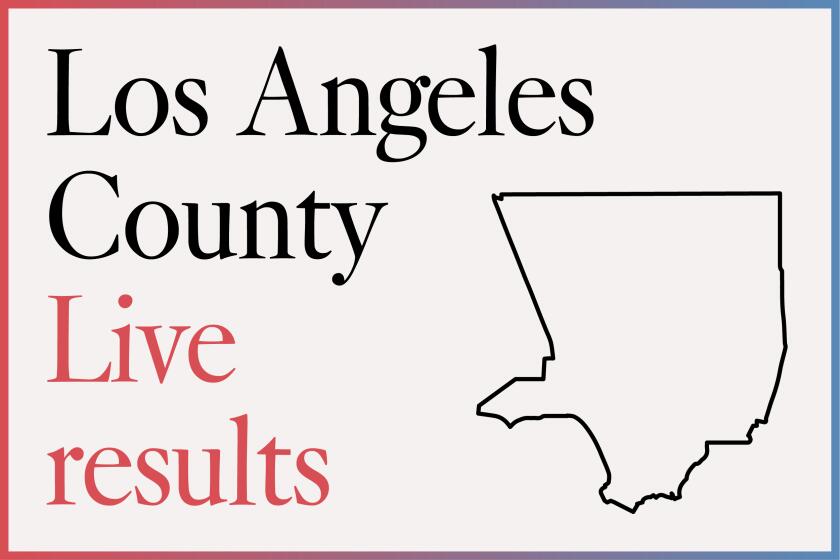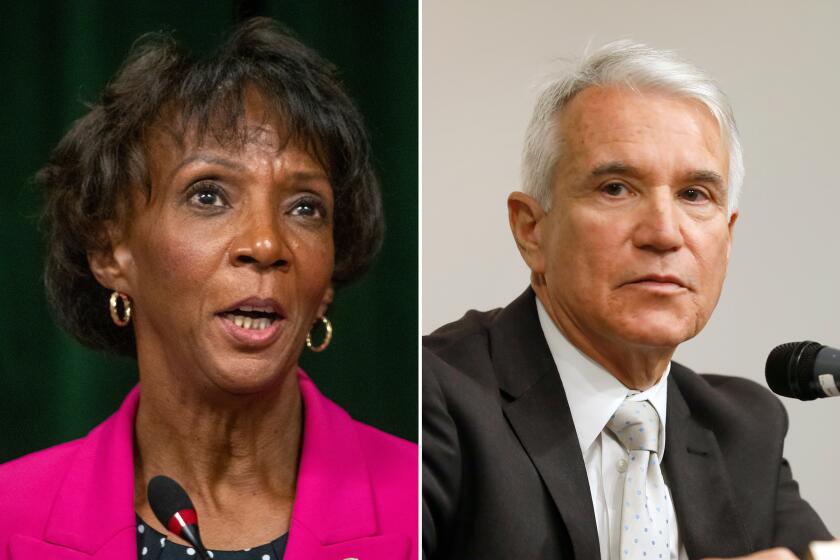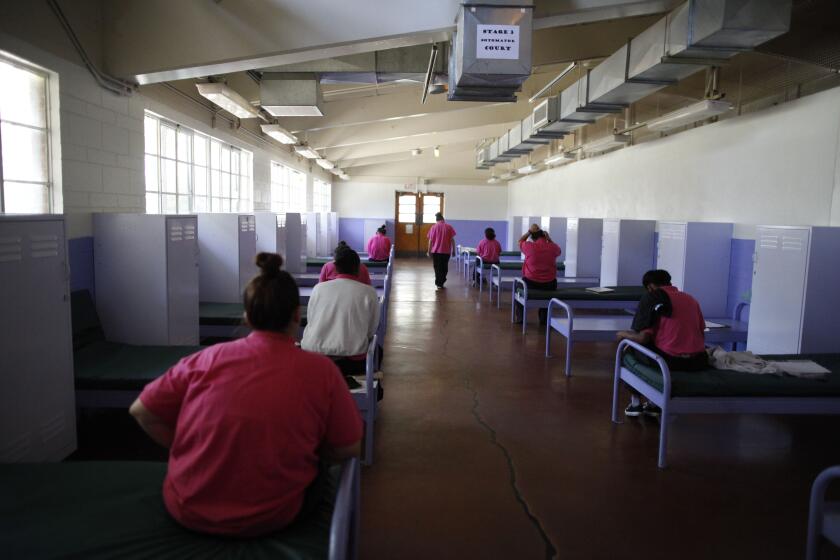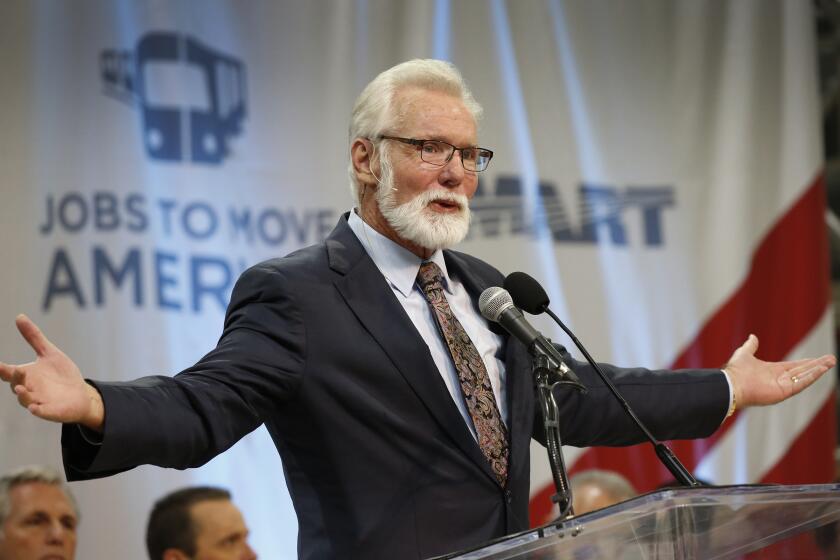George Gascón holds lead in L.A. County district attorney race
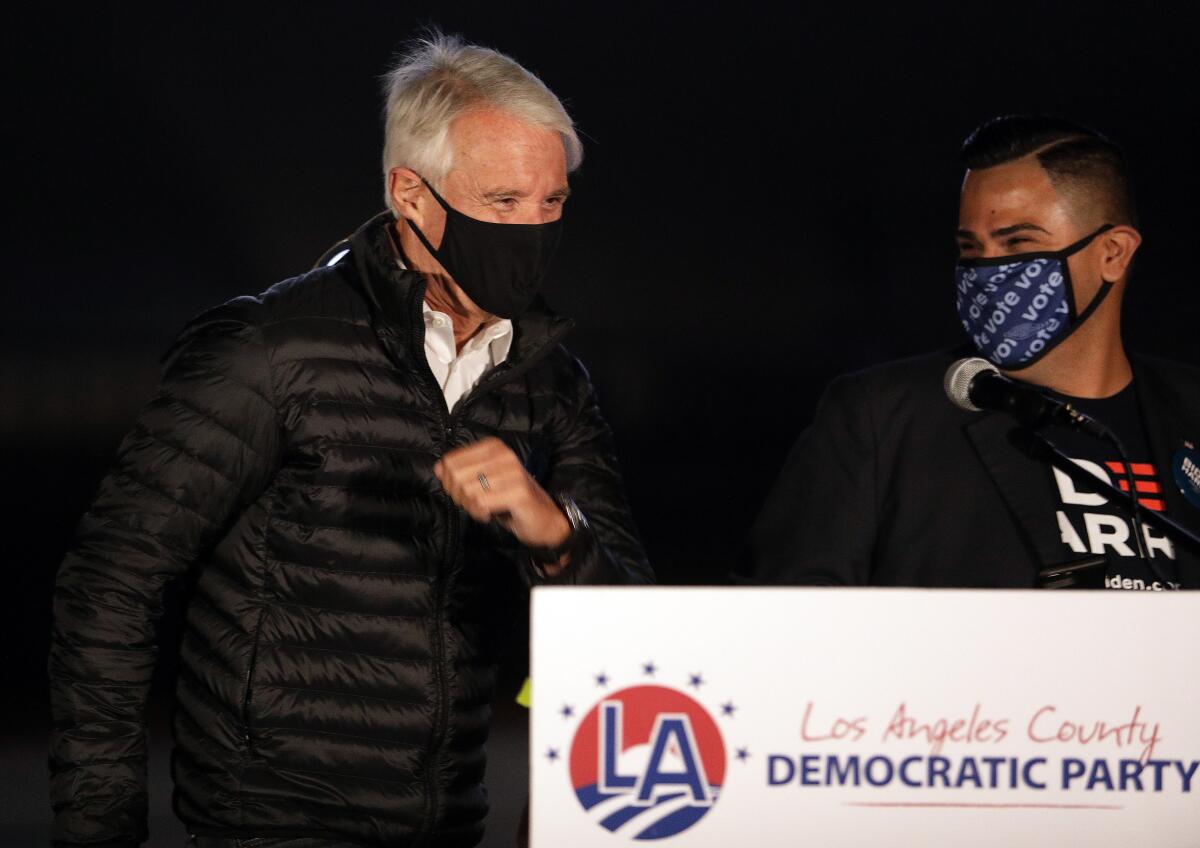
- Share via
Former San Francisco Dist. Atty. George Gascón is holding a steady lead over incumbent Los Angeles County Dist. Atty. Jackie Lacey in the nationally watched race to lead the nation’s largest local prosecutor’s office, a contest that has centered on criminal justice reform.
As of Wednesday morning, Gascón had captured 53.8% of the vote to Lacey’s 46.1%, holding a lead of about 211,000 votes. The county registrar’s office has tallied nearly 3.2 millions ballots, but did not expect to update vote totals again until Wednesday afternoon.
It was not clear how many ballots were left to be counted. L.A. County is home to 5.8 million registered voters.
The contest between Lacey and Gascón has been considered a litmus test of Southern California’s appetite for reform on a number of racial and criminal justice issues.
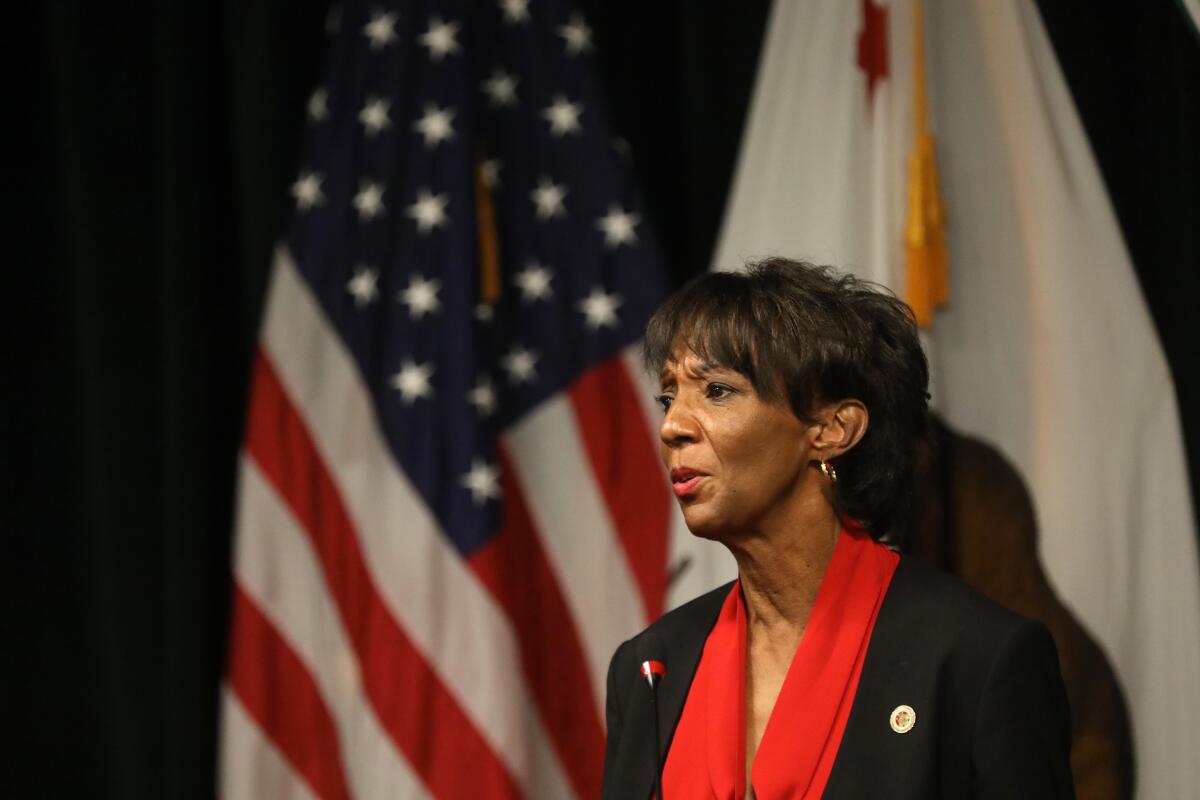
Gascón, 66, who served as San Francisco’s top prosecutor from 2011 to 2019, represents a wave of progressive prosecutors focused on reducing the criminal justice system’s footprint while maintaining public safety. The movement has achieved election victories in Chicago, Philadelphia and St. Louis in recent years, and a public defender was elected to replace Gascón last year in San Francisco.
Although Gascón has taken flak for surging property crime rates in San Francisco during his tenure and his involvement in the drafting of Proposition 47 — which changed several felonies to misdemeanors under California law — his use of diversion programs and ability to manage violent crime while lowering the city’s jail population have drawn praise.
A career prosecutor, Lacey, 63, showed some deference to the reform movement earlier this year when she moved to vacate tens of thousands of marijuana convictions and expressed an openness to letting outside agencies, such as the California attorney general’s office, review controversial officer-involved shootings. But of the two, Lacey, the first woman and first African American to head the district attorney’s office, is considered the more traditional tough-on-crime prosecutor and has remained a favorite of law enforcement.
Shortly after he spoke to supporters at a drive-in event at the Los Angeles Zoo sponsored by the L.A. County Democratic Party, Gascón expressed optimism and praised his campaign as colleagues alerted him to early returns, which initially had him up by a wide margin.
“Regardless of what the outcome is, I feel very, very good about the work that we did. I think we’ve moved the needle regardless,” he said. “Obviously if I get elected, we’ll roll up our sleeves, and I really hope that L.A. County’s criminal justice system will be the shining house on the hill, if you will, that we will be the example for other communities, that we will show that we can have both safety and humanity.”
Lacey, who was watching the results with her family at their Granada Hills home, said earlier in the night that she felt confident that her record on public safety and her wealth of experience as a prosecutor would resonate with voters, especially when compared with Gascón’s lack of trial experience.
“I would be surprised if the majority of people in L.A. County were willing to say we’re safe enough. Let’s just go for reform. Let’s be bold about it. There’s no reason to really pay attention to these details,” she said.
Lacey’s campaign coordinator, Walter Koch, cautioned against overreacting to early tallies that had yet to include election day voters. The vast majority of the ballots that have been counted already are mail-in ballots returned before election day, which have skewed favorably toward progressives nationwide.
Lacey, elected in 2012 and seeking a third term, nearly ended the race in March. Early returns showed her hovering above the 50%-plus-one vote share needed to win reelection outright in the primary, but Gascón and former public defender Rachel Rossi picked up enough ballots to hold her under that threshold. Still, with Gascón finishing roughly 20 percentage points behind Lacey, many political observers began to question if he entered the race too late or failed to broaden his appeal beyond activists.
But the dynamics of the race shifted dramatically following the police killings of George Floyd in Minneapolis and Breonna Taylor in Louisville, Ky., which sparked massive protests against police brutality in Los Angeles and across the U.S. Lacey has often faced criticism for declining to charge Los Angeles police officers and sheriff’s deputies in a number of controversial shootings of unarmed men during her eight years in office.
Gascón did not charge an officer in a fatal use of force case during his eight-year tenure in office in San Francisco either, but championed legislation last year that lowered the threshold for officers to be charged in such cases. He has also promised, if elected, to reopen investigations into a number of officer-involved shootings in which Lacey declined to file charges.
Nationwide calls for criminal justice reform drew more attention to the race, and Gascón picked up endorsements from vice presidential candidate Kamala Harris and U.S. Sens. Bernie Sanders (D-Vermont) and Elizabeth Warren (D-Mass.). Prominent California politicians, including U.S. Rep. Adam Schiff (D-Burbank) and L.A. Mayor Eric Garcetti, dropped their endorsements of Lacey and chose to back Gascón instead.
Lacey, meanwhile, was backed by Sen. Dianne Feinstein (D-Calif.), several members of the Los Angeles County Board of Supervisors and San Francisco Mayor London Breed.
Jackie Lacey vs. George Gascón: Here’s everything you need to know about the L.A County district attorney’s race.
The race was deeply contentious, with Gascón and Lacey trading barbs across digital ads and during a slate of four debates between the primary and general elections. Gascón’s surrogates had begun comparing Lacey’s rhetoric on fears of crime spikes under Gascón to some of President Trump’s attacks on his political opponents in the late stages of the campaign, while Lacey repeatedly tried to paint her opponent as an opportunist who didn’t care about crime victims.
Local activists dogged Lacey often during the campaign, protesting outside her house and office on several occasions throughout the summer. Lacey has said she received numerous death threats throughout the campaign, at least one of which sparked a Long Beach police investigation. A clash with Black Lives Matter organizers outside her home in early March ended with her husband, David, pointing a gun at three unarmed demonstrators. David Lacey was charged with three counts of misdemeanor assault by the California attorney general’s office.
As interest increased, more than $19 million poured into the race. Lacey collected roughly $7 million in her reelection bid, much of it coming in a flood of law enforcement union contributions from organizations representing rank-and-file L.A. police officers and county sheriff’s deputies.
Gascón’s coffers surged above $12 million by the end of the race, with much of his funding coming from Bay Area mega-donors who have backed reforms such as Proposition 47, which reclassified some nonviolent offenses from felonies to misdemeanors, and measures to abolish the death penalty. Liberal philanthropist George Soros also gave more than $2 million to Gascón, and the political action committee Color Of Change raised more than $3 million for Gascon in the final two months of the race.
More to Read
Sign up for Essential California
The most important California stories and recommendations in your inbox every morning.
You may occasionally receive promotional content from the Los Angeles Times.
